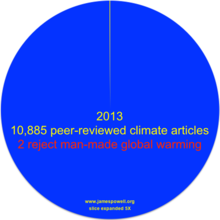I was trying to think of a simple way of showing that the radiation continues in both objects even if their temperatures are the same. when a photon is emitted it imparts a small amount of momentum to the emiiter and the same amount of momentum in the opposite direction in the absorber. (this is one of the forms of entropy increase that precludes perpetual motion machines). therefore the two objects should slightly move away from each other. if SSDD is right, and the objects simply stop radiating, then the objects will not only lose the slight repulsive force but the unopposed momentum shift from the opposite side of the objects will actually drive the objects closer. this would decrease entropy. isnt there some pretty strict rules about S ?
SSDD- I couldnt help but notice that your response to this comment ignored the entropy problem with your unexplained on/off radiation theory.
I don't understand why you have to make up a position for me....I have stated it as clearly as possible...I have said over and over that I can't explain why energy only flows from warm to cool...and I have never said on/off...I have said that I don't think objects radiate towards warmer objects....and every observation ever made bears that out....
As to strict rules...there are some pretty strict ones regarding the direction of energy flow but you have no problem disregarding them in favor of an unobservable, untestable, unmeasurable mathematical model.
And do explain how you think a photon (if they exist) with no mass can impart momentum to anything...more magic?
I would like to thank you. it is an interesting puzzle to try and explain quantum related aspects of reality without being able to use quantum physics. of course it is impossible, but there are certainly paradoxes that can be pointed out which show the need for understanding more than just newtonian physics.
an example to show photons have momentum; a comet tail. the momentum from sunlight pushes dust away from the comet in the opposite direction of the sun. interesting sidebar; when the comet is still quite far away there is often a second tail at a slightly different angle. what causes that one, and why the different angle? (hint- speed)
to get the idea of how a massless particle can have momentum all we have to do is look at particle accelerators (unobservable, untestable, unmeasurable? hahahaha). by classical physics the energy needed to accelerate an electron or proton up to the speed of light is actually quite small. but when the particle starts getting closer to the speed of light, the energy is converted into momentum rather than velocity, giving the impression that the particle has gained mass. but it is not mass as classical newtonian physics describes it and neither is the momentum.
quantum physics is not unobserved, untested or unmeasured. but it doesnt easily make sense when compared to the non relativistic, macroscopic world that we live in.





